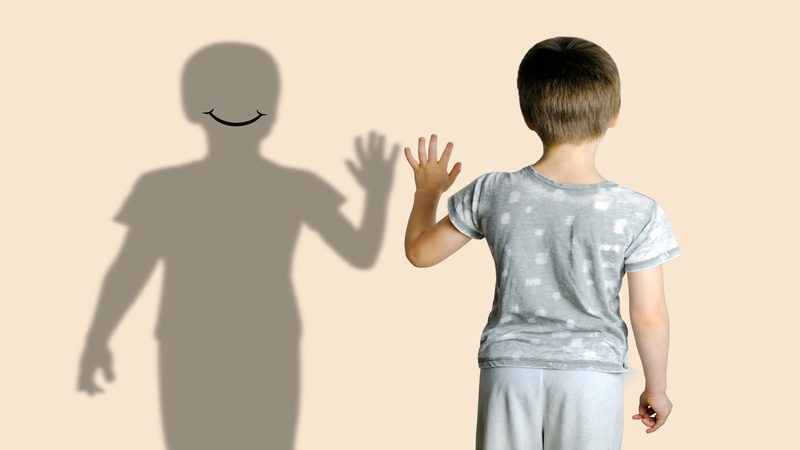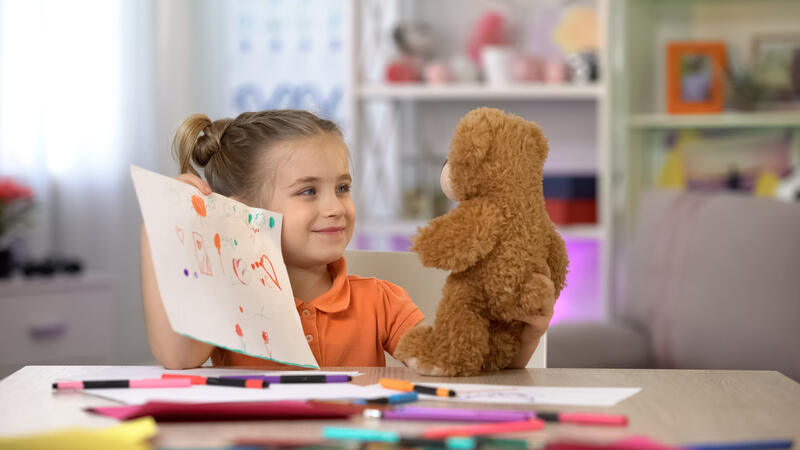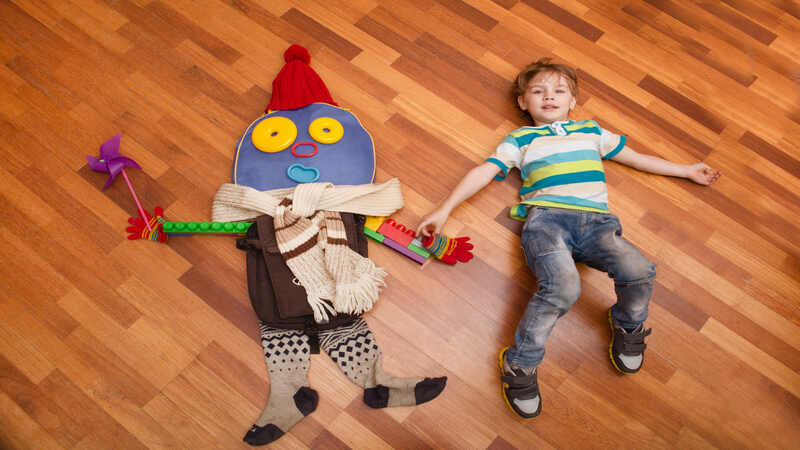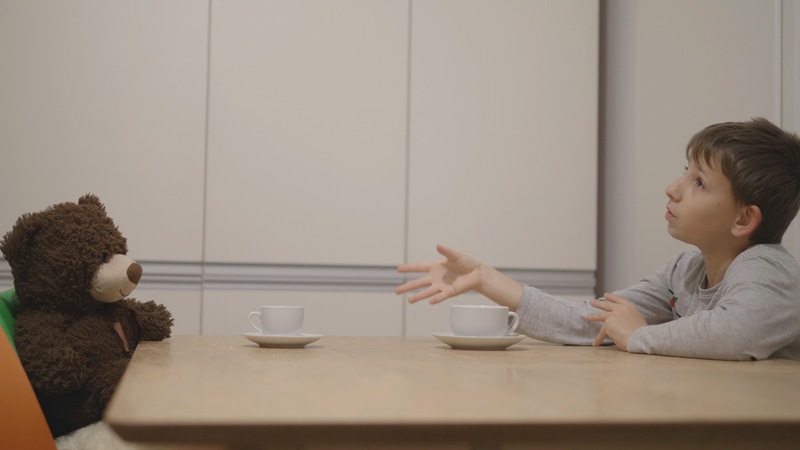
One day as you step into your child’s room, you may catch them having a conversation with an entity who is nowhere present there. Should you be worried? Is it normal? Several questions may seem to surround you in no time. However, remember that imaginary friends in children are true companions who are real and life-like to them.
These characters are figments of imagination yet hold a lot of significance in your child’s life. Their presence offers solace and companionship, sparks creativity like none other. It is common in childhood years and fades away as the child matures.
In This Article
- What is an Imaginary Friend?
- Child Development And Imaginary Friends
- Is it Normal to Have Imaginary Friends?
- At What Age do Children Have Imaginary Friends?
- How Long do Imaginary Friends Last?
- Why do Children Make Imaginary Friends?
- Benefits of Having Imaginary Friends
- How to Deal With Your Child’s Imaginary Friends?
- When do Imaginary Friends Become a Problem?
- FAQ’s
What is an Imaginary Friend?

An imaginary friend is a fictional entity created by children while they play with their toys all alone. Your child’s fertile imagination has the power to create life-like entities who are not physically present yet become their close companions and confidants. Though invisible and intangible to others, these imaginary friends interact with your child and form emotional bonding with them.
From objects – like the doll or the bunny, to invisible humans, shapes and animals – anyone can take the place of your child’s imagination and creativity. It can also be a fairy, a magical person, or even a star with whom your child plays, shares, and rejoices happy moments of joy and laughter. Researches have shown that 28% of children in the age group of 5-12 years have imaginary companions (1).
Child Development And Imaginary Friends
Having imaginary friends is a part of child development. It is a sign that your child is learning the art of role play, improving their communication skills and developing creativity. Serving as playmates, these imaginary friends help to develop emotional bonding in children. Moreover, they learn the art of sharing, tolerance and patience (2).
Is it Normal to Have Imaginary Friends?

An imaginary friend has a realistic existence in a child’s life. Thus, it is a normal developmental pattern and there is nothing abnormal about it. The invisible friend can surface in a child’s life in late toddler years, around 3 years and can go on till late childhood till 7 years (3). At this time, the child’s imagination is at its peak. They develop social skills and emotional bonding at this time and imaginary friends act as a real-life lesson for them.
At What Age do Children Have Imaginary Friends?

Imaginary friends in children surface during the ages of 3 and 4 years. A first born can make an imaginary friend a bit earlier as well (4). This imaginary friend can be another child, an animal, a toy, or anything that your child has recently seen and loved. The friend can also be a magical person or a fairy. Sometimes, these friends change as a child grows up, and eventually disappear as the real world life takes over.
How Long do Imaginary Friends Last?

The duration of an imaginary friend may last for a few days, to months, and even for a few years into childhood. It all depends upon the child, their family upbringing, and other social factors. Imaginary friends typically start to fade as children grow older and develop stronger social connections with peers. As they become more engaged in real-life friendships and activities, the need for an imaginary friend often diminishes.
Why do Children Make Imaginary Friends?

Some parents may jump to conclusions that children develop imaginary friends because they’re either lonely or lack social skills to freely mix with real-life peers. However, this is not true. There are various reasons why children make pretend friends-
- Sense of Control: With imaginary friends, they assert a sense of authority and control. It provides them with the pleasure of directing someone else’s actions and decisions.
- Satisfy Their Fantasies: They make up friends hailing from the Wonderland, Superman or Spiderman which they cannot find in real lives
- Boosting Confidence: They can do whatever they want to with the imaginary friend and no one scolds them. Thus building confidence
- A Solution to Boredom: It is mainly seen in single children. Until they go out to play, there is no one to play with them at home. So, better to create a make-believe mate and play with them!
- To Deal Away With Shyness: For kids who are shy, having imaginary friends is a good way to speak their hearts out with them without having to fear of being judged or bullied
- Use as Scapegoats: It is the most convenient way for kids to blame it on the other person for doing something wrong.
Benefits of Having Imaginary Friends

Some of the benefits of having an imaginary buddy includes the following-
- Imaginary or pretend friends can give your child company when they need, playing different games and stories
- Pretend friends also pave a way for a kid to interact with the outside world
- It helps kids to develop empathy and compassion for real life peers
- The child gets a sense of control as they take charge of all that happens between the imaginary friend and themself
- Imaginary friends are also excellent stress busters for kids
How to Deal With Your Child’s Imaginary Friends?

As a parent, you may initially feel awkward about these imaginary buddies in your child’s life. However, you can deal with them differently-
- Embrace your child’s imagination and consider their buddy as someone life-like
- Join in the fun and play with your child and observe them having all sorts of fun
- Set boundaries and let your child know where they can have fun with imaginary friends
- Always encourage your child to build real social connections with peers
When do Imaginary Friends Become a Problem?

Typically, your child’s imaginary friend is not a cause of concern unless it interferes with their daily life socialization process. However, certain caution is always needed-
- If your child uses their pretend buddy as an escape from mistakes they made, then you should intervene
- Sometimes, you may see them avoiding social interactions when guests come over, in such cases you should take steps to promote socialization
- If they fear the imaginary friend
- Any change in your child’s attitude
- If your child is prompted by imaginary friend to do something harmful
Imaginary friends in children are beneficial and promote healthy social and communication skill development. While they provide comfort and companionship to the child, parents also need to monitor the play time so that the interaction with make-belief friends remains joyful, yet healthy and balanced.
FAQ’s
1. Are Imaginary Friends a Trauma Response?
Sometimes imaginary friends can act as a trauma response if the child has recently suffered a loss at home, such as death of a loved one, or visualized a scene of parents’ separation. The friend offers comfort and emotional support to the child.
2. Is Imaginary Friends a Mental Illness?
Having imaginary friends is not a mental illness. It is a normal part of development and offers many benefits to the child by developing social skills and offering them comfort and companionship whenever they feel like.
References
- The role of imaginary companion in the life of only children: a qualitative study – [https://bmcpsychiatry.biomedcentral.com/articles/10.1186/s12888-023-05360-0]
- The psychological significance of play with imaginary companions in early childhood – [https://link.springer.com/article/10.3758/s13420-017-0284-z]
- Imaginary Friend – [https://www.sciencedirect.com/topics/psychology/imaginary-friend]
- Imaginary Friendships Could Boost Child Development – [https://www.sciencedaily.com/releases/2005/03/050308101309.htm]
